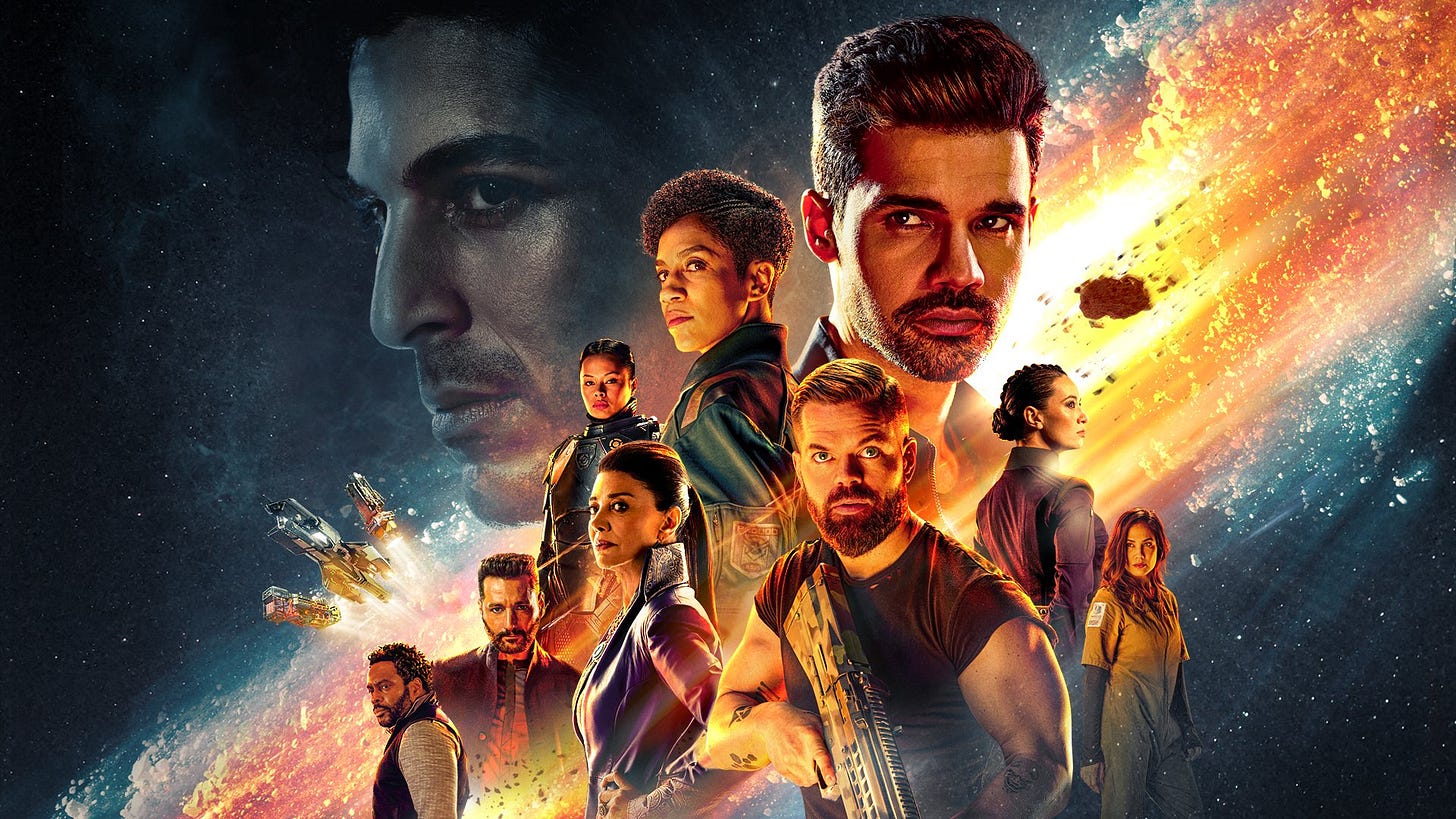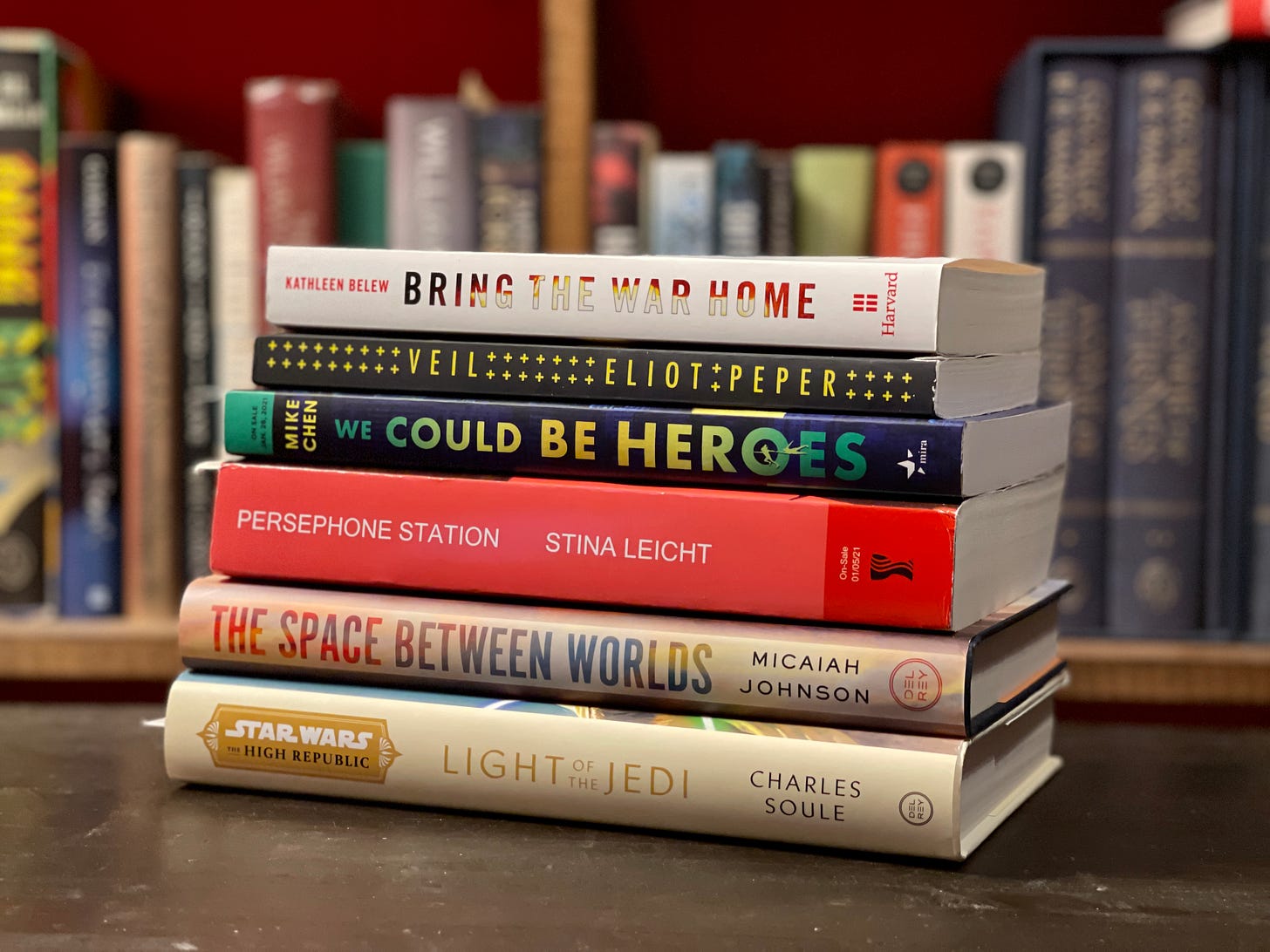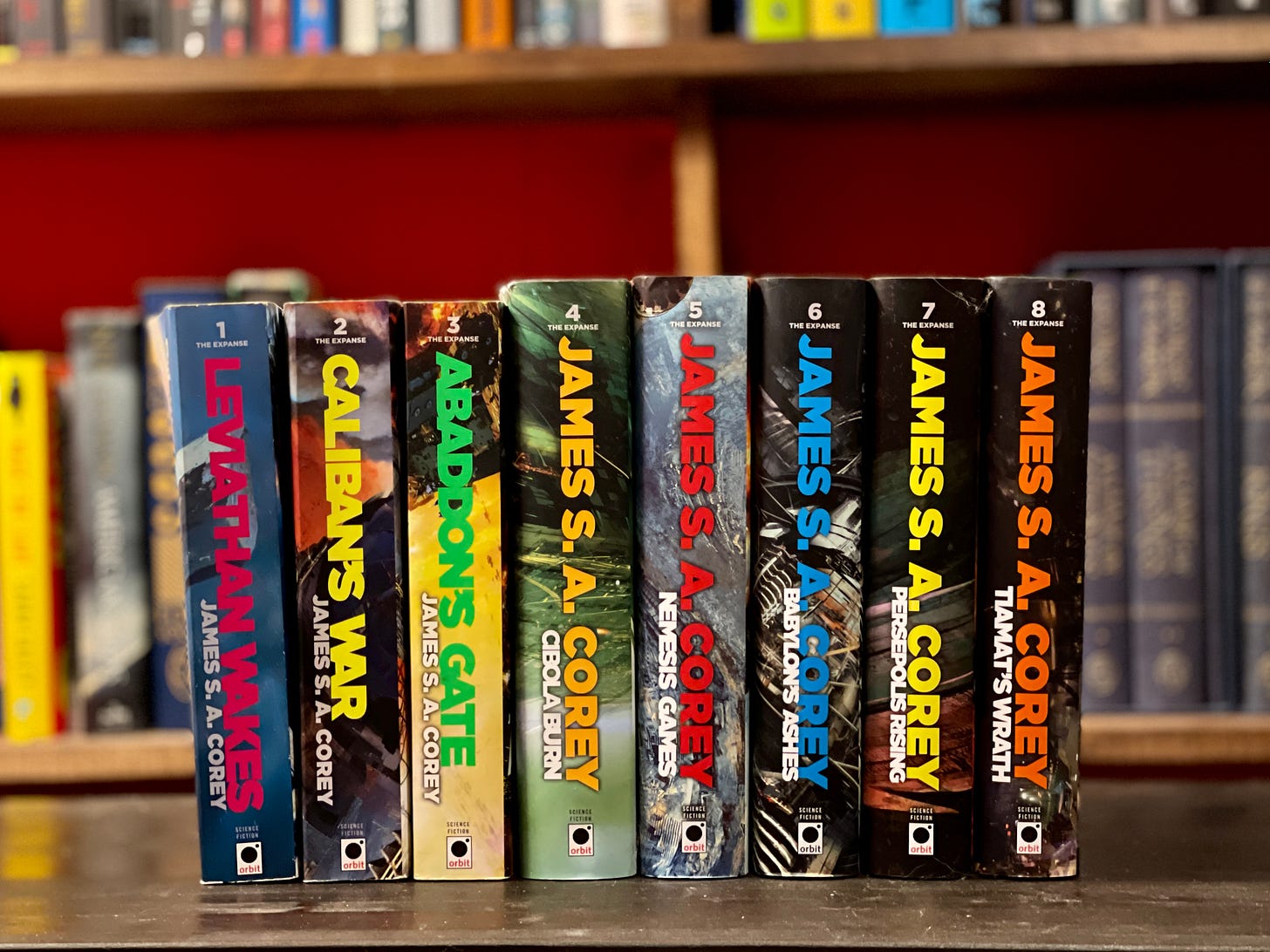All Expanse all the time

I made a cool finding earlier this week: while lamenting with some friends about the demise of the Barnes & Noble Sci-Fi & Fantasy Blog, my former editor, Joel Cunningham, said to double-check the rights — he couldn’t remember where ownership lies for the pieces that I wrote for it.
Typically, sites will ask you to sign away the ownership for the things you write for them. It’s not an optimal situation, but it helps to pay the bills — and in most cases, most posts aren’t really worth recycling anywhere else, either because they’re news posts or timed to something specific.
But, I wrote a lot of what I’d consider “evergreen” pieces for B&N, and during our conversation, I dug out my old contract to see what the status was with the rights. As it turns out, I was misremembering an important detail: the contract specifically states that I hold the copyright!
So, I’ve been going through my posts there to see what’s worth reposting. One you already saw this week: Waking the Leviathan, about James S.A. Corey’s The Expanse series. There are a bunch of others — about Chinese SF, a big series about the history of the Star Wars EU, a bunch of appreciations for older book trilogies by the likes of Mike Stackpole, Karin Lowachee, Karen Traviss, Nancy Kress, and others. So, I’ll be working on pulling those out and when there’s a good time to republish them, I’ll do so.
In the meantime, it’s been a pretty quiet week this week when it comes to SF/F news, save for one thing: Season 5 of The Expanse wrapped up this week, and that’s pretty much what I’m focused on today. Let’s dig in.

The Week in SF/F
Season 5 of The Expanse comes to a close
The penultimate season is now done. I have yet to finish it up: I’ve been waiting for it to come out all at once (I’ve also been binging another big show, Babylon 5, so that’s taken up some time), so I don’t have any deep thoughts about how well the season worked compared to the others, but I’ve liked what I’ve seen thus far. Judging from the amount of squealing I’ve seen online about it, people seem to be pretty happy with it.
The show’s been renewed for a sixth and final season (which I thought I’d seen was resuming now, but I can’t find the tweet that I thought I saw.), which I imagine will likely end up streaming later this year or early next. It’ll be a big year for the franchise — the final book, Leviathan Falls is slated to hit stores at some point this year.
Interzone and PS Publishing Split
A couple of weeks ago, TTA Press and PS Publishing announced that the latter would be taking over long-running British SF magazine Interzone. The move was apparently initiated by the magazine’s publisher, Andy Cox, to help reduce his workload and focus on other projects like Black Static. There would be some changes: PS Publishing revealed that it was bringing on Ian Whates to edit the magazine, and that it would relaunch later this year on a quarterly schedule and as a digital publication. At the time, TTA said that “we are very pleased to be able to pass the magazine on to such safe hands. We wish the new team the best of luck and look forward to this exciting new stage of Interzone's long journey.”
There were apparently some outstanding questions about subscriptions, and concerns were great enough to prompt TTA to abruptly reverse course on the deal. “Unfortunately, it turned out that the terms of the takeover weren't going to be met as expected, so we had no choice but to withdraw the magazine. In other words, we are still the publisher of Interzone.” Not everyone’s happy: Whates noted on Facebook that “after working solidly for three weeks on the project this came as a body blow to me.”
The publication’s since reopened to submissions. And PS Publishing is still interested in moving forward with a digital magazine: Whates notes that it’ll be called ParSec. which he’ll edit. More details will come shortly, apparently.
Locus’ Recommended Stories
Locus is the industry publication for the SF/F community, and they have a strong bench of reviewers to examine what’s coming out each month. The magazine’s just released its annual recommended reading list, a snapshot of the best works for science fiction, fantasy, horror, YA, debuts, collections, anthologies, nonfiction, art, and shorter fiction categories. You can read the entire thing here.
You can also vote in their survey and awards poll, which I’d highly encourage folks to do — they have a good demographics survey that provides some useful information on the state of the genre’s fans. (You can also write in Transfer Orbit for a couple of categories if you wish!)

Currently Reading
I’ve been chugging away at a couple of books. I’ve since finished up Simon Stålenhag’s beautiful (and depressing) art book The Labyrinth, about a post apocalyptic Earth. I’ve also finally wrapped up Alix E. Harrow’s The Once and Future Witches, a bold, feminist look at power and the fight for equality. I felt this one lagged a bit in the middle, but it ended with a nice punch. I’ll have some bigger thoughts on that at some point.
Coming up on the immediate TBR pile: Charles Soule’s Light of the Jedi, Kathleen Belew’s Bring the War Home, and Eliot Peper’s Veil. After that, I’ve got Mike Chen’s We Could Be Heroes, Stina Leicht’s Persephone Station, and Micaiah Johnson’s The Space Between Worlds.

Further Reading
- Evolution of The Expanse. This is a bit of a self-plug, but as noted, I’ve republished my lengthy feature about James S.A. Corey’s The Expanse series, which explores how the series went from world to gaming concept to book series to television series.
Economics of The Expanse. Variety has a regular podcast called Strictly Business, and the latest installment is definitely worth a listen if you’re interested at all in streaming television / films / etc. The guests in this latest episode are Alcon Entertainment co-CEOs Andrew Kosove and Broderick Johnson, and they go into some considerable depth about the economics behind the TV series. There are a couple of interesting takeaways here, some of which I’ve known, but it’s good to hear firsthand:
- Alcon bought the underlying IP rights for the franchise for things like movies, graphic novels, etc., and those are all things that they’re considering.
- Along those lines, they outlined the arrangement with Syfy: essentially, the network licensed the show (and only licensed the linear TV rights!), and ended up stopping that arrangement when it didn’t make financial sense, in part because of the shift to streaming. They emphasized that the network didn’t cancel the series — something Abraham and Franck have told me — they didn’t re-up their license for the series.
- When that happened, Alcon ended up looking for another place to license it, and went with Amazon, with which they already had an existing relationship through streaming. I remember this as being a particular frustration point, because it was so hard to watch the series if you didn’t subscribe to Syfy. And while they didn’t say it, I get the sense that shifting to Amazon helped raise the profile of the series beyond what Syfy could do, because you could binge-watch the entire thing.
- They indicated that the series has been extremely successful on a number of fronts: going to Syfy worked well, going to Amazon worked well, and they’re still very much invested in the series as intellectual property. I get the feeling that even though the series is coming to a close, the world will continue on at some point and in some other form.
- They also emphasized that the movie and TV markets are changing quite a bit, and that television is extremely lucrative IP, something I’ve been banging a drum about on this newsletter for a while now. It’s nice to get that confirmation from a new source.
- Impact of The Expanse. Writing at Esquire, Charlie Jane Anders has an excellent look at the modern state of space opera, and the role that The Expanse had in revitalizing the genre. She takes a neat look through the history of the genre and how some problematic elements of its origins like colonization and eugenics were a key part of the genre. But now, there’s a flood of other space opera books. “At its best, this new wave of space opera doesn't just offer alternatives to those old themes of manifest destiny—but also offers a critique of them.”
- Amazon’s motivations. And in the interest in offering up some non-Expanse long reads, my friend Jared Shurin has an interesting column up on The Bookseller about the reasons why Amazon didn’t buy publisher Simon & Schuster. That was the rumor for a while — before Penguin Random House scarfed it up back in December, and he points out that while it does seem like an appealing acquisition on its surface, it’s out of character for what Amazon usually picks up. It’s acquired companies like Comixology and Twitch, but not necessarily content creators. “Amazon’s acquisitions also show that they’re also interested in smoothing the path to purchase,” he writes, noting that Amazon’s less interested in creating the content than it is in controlling the distribution. “Adding a publisher brings Amazon no additional value here.” And indeed, Amazon already hosts a lot of self-published work already — way more than S&S does.
- Buck Rogers’ Potential. Buck Rogers is a well-known fixture of science fiction, and there’s been a lot of interest in the character lately, with a couple of studios working on dueling projects. I wrote up a piece for subscribers yesterday about the potential — and the potential, problematic pitfalls that the property holds that both will have to overcome in order to succeed.
- Cyberpunk’s Orientalist fantasies. Kazuma Hashimoto has an interesting piece over on Polygon about Cyberpunk’s tendencies towards incorporating Asian asthetics into their futures — elements baked in from authors like William Gibson and director Ridley Scott — which harken back to the economic anxieties about globalization in the 1980s. In doing so, it’s carried with it some xenophobic traits that persist to the modern day. “Cyberpunk stories can be told effectively without supplanting the fear of the “other” while simultaneously aping culture for the sake of aesthetics.”
- Harry Potter fandom & J.K. Rowling. I’ve long been a fan of Annalee Newitz and Charlie Jane Anders’ podcast Our Opinions Are Correct, and a recent episode is particularly good: “Has J.K. Rowling destroyed Harry Potter fandom?” The two chat with Cecilia Tan about how Rowling’s transphobic views have percolated down into HP fandom, which has a vibrant fan fiction and cosplay scene. The short answer is that it’s really complicated, and it’s a painful thing for some fans.
That’s all for this quiet week. Coming up next week: I’m working on getting a couple of posts finished up: terrorism, climate change, and a couple of others. Next week is also the Chinese New Year (Friday the 12th), and I’ll be republishing a history of Chinese SF that I wrote for Barnes & Noble, with some minor edits and additions.
In the meantime, let me know what you’ve been reading!
Andrew